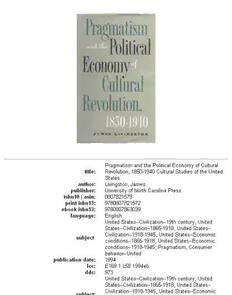
Pragmatism and the political economy of cultural revolution, 1850-1940 PDF
01994·1.053 MB·English
Most books are stored in the elastic cloud where traffic is expensive. For this reason, we have a limit on daily download.
Preview Pragmatism and the political economy of cultural revolution, 1850-1940
Description:
The rise of corporate capitalism was a cultural revolution as well as an economic event, according to James Livingston. That revolution resides, he argues, in the fundamental reconstruction of selfhood, or subjectivity, that attends the advent of an 'age of surplus' under corporate auspices. From this standpoint, consumer culture represents a transition to a society in which identities as well as incomes are not necessarily derived from the possession of productive labor or property. From the same standpoint, pragmatism and literary naturalism become ways of accommodating the new forms of solidarity and subjectivity enabled by the emergence of corporate capitalism. So conceived, they become ways of articulating alternatives to modern, possessive individualism. Livingston argues accordingly that the flight from pragmatism led by Lewis Mumford was an attempt to refurbish a romantic version of modern, possessive individualism. This attempt still shapes our reading of pragmatism, Livingston claims, and will continue to do so until we understand that William James was not merely a well-meaning middleman between Charles Peirce and John Dewey and that James's pragmatism was both a working model of postmodern subjectivity and a novel critique of capitalism.
See more
The list of books you might like
Most books are stored in the elastic cloud where traffic is expensive. For this reason, we have a limit on daily download.
